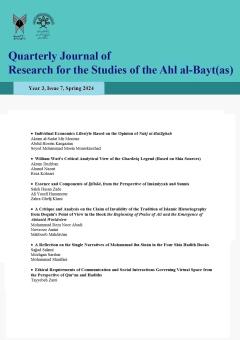William Watt's Critical Analytical View of the Gharāniq Legend (Based on Shiʿa Sources)
Subject Areas : Quarterly Journal of Research for the Studies of the Ahl al-BaytAkram Dezhban 1 , Ahmad Nazari 2 * , Reza Kohsari 3
1 - PhD student of Quranic Sciences and Hadith, Semnan Branch, Islamic Azad University, Semnan, Iran.
2 - Assistant Professor, Department of Theology (Qur'anic Sciences and Exegesis), Shahroud Branch, Islamic Azad University, Semnan, Iran (corresponding author).
3 - Assistant Professor, Department of Theology (Islamic Theology), Semnan Branch, Islamic Azad University, Semnan, Iran.
Keywords: Legend of Gharāniq, William Watt, Orientalists, Doubts.,
Abstract :
One of the legends and superstitious stories that have been narrated in some non-authentic commentary and hadith texts and used as a reason to raise doubts is the legend known as Gharāniq. In this research, the doubts in the field of Gharāniq story are discussed based on the views of an orientalist named William Watt using the descriptive-analytical method. Investigations show that the source of Watt's views in raising doubts about the Gharāniq legend is some sources of interpretation and hadith of the Sunnis, which, in addition to the weakness of the documents, have differences and differences in content. In addition, the story known as Gharāniq contradicts the verses of the Qur'an indicating the weakness of the devil, the infallibility of the Prophet in receiving and communicating revelation, the power of Allah Almighty in guaranteeing the revelation, the high position of the angel of revelation, and so on. Shia thinkers have not mentioned this superstitious story in any of their authentic books, and also some honest orientalists, along with Shia thinkers, have considered the legend of Gharāniq as unreal and invalid. Community Verified icon.
قرآن کریم؛ ترجمه ناصر مکارم شیرازی.
آلوسی، سید محمود، روح المعانی فی تفسیرالقرآن العظیم، بیروت: دارالکتب العلمیۀ، 1415ق.
آرمسترانگ، کارن، زندگی¬نامه پیامبر اسلام (ص)، ترجمه کیانوش حشمتی، تهران: حکمت، 1383ش.
ابوالفتوح رازی، حسین بن علی، روض الجنان و روح الجنان فی تفسیر القرآن، مشه: آستان قدس رضوی (ع)، 1415ق.
حتی، فیلیپ، تاریخ عرب، ترجمه محمدسعیدی، تهران: کتابفروشی زوار، بی¬تا.
دیون پورت، جان، عذر تقصیر به پیشگاه محمد و قرآن، ترجمه غلامرضا سعیدی، تهران: اطلاعات، 1383ش.
سبحانی، جعفر، فروغ ابدیت، قم: انتشارات دفتر تبلیغات اسلامی، 1370ش.
طباطبایی، سید محمدحسین، المیزان فی تفسیرالقرآن، قم: جامعه مدرسین وابسته به حوزه علمیه قم، 1374ش.
طبرسی، فضل بن حسن، مجمع البیان فی تفسیرالقرآن، تهران: فراهانی، 1372ش.
طبری، محمد بن جریر، جامع البیان عن تأویل آی القرآن، بیروت: دارالفکر، 1408ق.
عسکری، مرتضی، نقش ائمه در احیای دین، تهران: منیر، 1382ش.
فخر رازی، محمد بن عمر، تفسیرالکبیر، بیروت: دارإحیاء التراث العربی، 1415ق.
قاضی عیاض، الشفا بتعریف حقوق المصطفی، بیروت: دارالفکر، 1426ق.
گلی زواره، غلامرضا، رسول اعظم از دیدگاه اروپاییان و مستشرقین، مجله دیدار آشنا، شماره 78 و 79، اسفند 1385.
مأمورزاده، فریده، بررسی سوء استفاده خاورشناسان از منابع اهل سنت و نقد آن از نگاه فریقین، رساله دکترای جامعۀ المصطفی العالمیۀ، 1395.
معرفت، محمدهادی، التمهید فی علوم القرآن، قم: التمهید، 1386ش.
------------، علوم قرآنی، قم: التمهید، 1378ش.
مکارم شیرازی، ناصر، تفسیر نمونه، تهران: دارالکتب الاسلامیۀ، 1374ش.
نیشابوری، حسن محمد، تفسیر غرائب القرآن، بیروت: دارالکتب العلمیۀ، 1416ق.
وات، مونتگمری ویلیام، برخورد آرای مسلمانان و مسیحیان، ترجمه محمدحسین آریان، دفتر نشر فرهنگ اسلامی، 1373.
William Montgomery watt, mohammad at mecca,oxford,clarendon press,1953.

